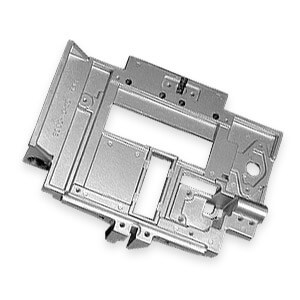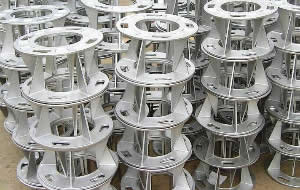Checking out the Duty of Factory Services ahead of time Modern Design Solutions
Shop solutions are necessary in forming contemporary engineering services - Precision aluminum casting. They link the gap in between standard production methods and the demands of contemporary sectors. With advancements in automation and sustainability, shops are advancing to fulfill the demands of fields such as aerospace and automotive. This transformation increases inquiries regarding the effects for products, processes, and future innovations. What opportunities and difficulties exist ahead for foundry solutions in this rapidly changing landscape?
The Development of Factory Providers in Design

The integration of computer-aided layout (CAD) and simulation software program has revolutionized the design and manufacturing processes, making it possible for shops to create complex geometries with higher accuracy. Moreover, the shift in the direction of green methods has resulted in the fostering of greener modern technologies and recycling efforts within foundries. As markets progressively prioritize personalization and fast prototyping, factory services have increased their capacities, ensuring they continue to be important factors to the engineering landscape. This advancement highlights the factory's essential duty in sustaining advancements throughout various sectors, consisting of automobile, aerospace, and power.
Trick Processes and Techniques in Modern Foundries
Modern shops employ a variety of essential processes and techniques that enhance the effectiveness and high quality of metal casting. Among these, sand casting stays widespread because of its adaptability and cost-effectiveness. Making use of sophisticated technologies, such as computer-aided layout (CAD) and computer-aided manufacturing (CAMERA), enables exact modeling and production, guaranteeing high precision in element dimensions. In addition, investment spreading is favored for generating complex geometries with outstanding surface coatings.
Moreover, automation and robotics boost manufacturing rate and uniformity while lowering labor expenses. Methods like additive production are significantly incorporated to generate elaborate mold and mildews and cores, thus reducing material waste. The application of thermal analysis aids in maximizing casting processes by controlling and anticipating solidification behavior. Jointly, these strategies and processes exhibit how contemporary factories are adjusting to fulfill the demands of modern engineering difficulties, making sure premium item quality and functional effectiveness.
The Importance of Materials Selection in Factory Solutions
Selecting the proper materials is vital in shop services, as it directly influences the mechanical buildings, durability, and overall efficiency of the end product. Different products possess unique characteristics, such as tensile toughness, deterioration resistance, and thermal stability, which should line up with the designated application of the cast parts. Steels like aluminum and steel are commonly chosen for their strength-to-weight ratio, while alloys can improve specific performance traits.
The selection procedure involves taking into consideration factors such as manufacturability, cost, and accessibility, which can significantly affect job timelines and spending plans. Furthermore, improvements in material scientific research make it possible for the development of ingenious compounds and specialized alloys that provide to emerging engineering challenges. A complete understanding of product homes and their ramifications is important for designers and foundry specialists to attain successful outcomes in their projects. This cautious selection procedure eventually enhances the dependability and effectiveness of completion items.
Shop Solutions in Aerospace and Automotive Applications
Foundry services play a necessary role in the aerospace and auto markets, where accuracy and efficiency are extremely important. These sectors rely greatly on the manufacturing of facility components that should satisfy strenuous quality requirements and stand up to extreme problems. Foundries offer crucial solutions such as casting, machining, and completing, making sure components are light-weight yet robust, vital for improving fuel efficiency and safety and security.
In aerospace, factory solutions add to the manufacturing of generator blades, engine elements, and structural parts, all blog here of which demand complex layouts and high-performance materials. In the auto market, foundries supply engine blocks, chassis components, and transmission cases, focusing on sturdiness and weight decrease.
Advanced foundry strategies, consisting of additive manufacturing and precision spreading, are progressively used to satisfy the particular needs of these industries. By supplying customized services, foundry services aid drive technology and maintain competitive benefits in the fast-evolving aerospace and vehicle landscapes.
Innovations Driven by Factory Capabilities
Many developments in design are sustained by the advanced abilities of factory solutions. These services make it possible for the manufacturing of intricate geometries and high-performance products that are crucial for modern applications. Additive production, frequently understood as 3D printing, has actually seen significant innovations with foundry strategies, enabling for the fast prototyping of complex styles. In addition, the ability to cast light-weight alloys has actually changed industries such as aerospace and auto, bring about boosted gas performance and efficiency.
Foundries are significantly incorporating clever innovations, such as automation and information analytics, to improve production effectiveness and top quality control. These advancements not just decrease waste yet additionally enable personalization at range, fulfilling the certain requirements of customers. By leveraging advanced factory abilities, engineers can explore brand-new frontiers in product design and functionality, inevitably driving development across different industries and developing a structure for future developments.
Future Patterns in Foundry Solutions and Engineering Solutions
The future of shop services is shaped by arising trends such as lasting production practices, which focus on ecological obligation. Automation and smart modern technologies are readied to enhance effectiveness and precision, while boosting customization and versatility will certainly fulfill the advancing needs of customers. As these fads advance, they will certainly redefine the landscape of design remedies in the shop market.
Sustainable Production Practices
As sectors increasingly focus on environmental responsibility, sustainable production methods within shop services are becoming important to contemporary engineering solutions. These practices concentrate on minimizing waste, reducing power intake, and utilizing environment-friendly products throughout the manufacturing procedure. By implementing methods such as reusing scrap metal and optimizing melting procedures, shops can significantly lower their carbon impact. Furthermore, the fostering of life process analyses allows suppliers to examine the environmental impact of their products from inception to disposal. Collaborating with providers devoted to sustainability even more improves the effectiveness of these initiatives. Inevitably, embracing lasting production not only lines up with international ecological goals yet likewise cultivates innovation and competition in the rapidly developing design landscape.
Automation and Smart Technologies
While several sectors are welcoming technical improvements, foundry services are experiencing a significant improvement with automation and wise modern technologies. The integration of robotics and automated systems enhances manufacturing efficiency, minimizes human mistake, and increases company website the production procedure. Smart innovations, such as IoT and AI, make it possible for real-time surveillance and anticipating maintenance, which enhance operational performance and reduce downtime. These advancements promote data-driven decision-making, enabling shops to react swiftly to market needs and enhance item top quality. In addition, automation minimizes labor costs and enhances workplace security by taking care of harmful tasks. As shop services remain to embrace these innovations, they are poised to redefine design options, bring about increased competition and sustainability in the manufacturing market.
Customization and Flexibility Fads
Arising patterns in factory services progressively stress personalization and adaptability to fulfill special consumer requirements. This change mirrors a broader demand for customized engineering services that adjust to particular task requirements and sector requirements. Companies are spending in sophisticated technologies, such as additive manufacturing and electronic modeling, enabling them to generate customized parts efficiently and cost-effectively. Because of this, shops are relocating far from one-size-fits-all strategies, using customers the ability to change layouts and materials in real-time. In addition, partnership in between engineering groups and shop services is becoming more integrated, cultivating technology and speeding up time-to-market. This pattern not only boosts item performance but likewise sustains sustainability by decreasing waste with accurate manufacturing procedures.
Regularly Asked Concerns
What Are the Typical Costs Related To Shop Providers?
Normal expenses connected with shop solutions consist of material expenditures, labor costs, equipment use charges, and overhead expenses - Aluminum Foundry. These expenditures can vary widely based upon job intricacy, volume, and certain requirements of the engineering service involved
How Lengthy Does the Foundry Process Usually Take?
The shop procedure typically takes anywhere from numerous weeks More Info to a couple of months, relying on factors such as intricacy, product requirements, and manufacturing quantity, which can greatly affect timelines and overall job shipment.
What Industries Benefit A Lot Of From Foundry Services?
Industries such as auto, aerospace, and building and construction benefit significantly from factory solutions. These markets rely upon precision casting and metal fabrication to produce intricate parts, boosting product efficiency and functional performance in their corresponding applications.
What Certifications Should Shops Have?
Foundries ought to have certifications such as ISO 9001 for high quality monitoring, ISO 14001 for ecological monitoring, and certain market certifications like AS9100 for aerospace or IATF 16949 for auto, guaranteeing conformity and quality control.
How Do Foundries Guarantee Quality Assurance in Their Processes?

Factory services are vital in forming modern design solutions. As design disciplines have actually progressed, the role of foundry services has changed greatly to satisfy advancing market needs. As industries increasingly focus on personalization and quick prototyping, shop services have increased their capacities, guaranteeing they continue to be vital contributors to the engineering landscape. As industries increasingly prioritize ecological responsibility, lasting production methods within factory services are coming to be essential to contemporary design remedies. Furthermore, collaboration in between engineering groups and foundry services is becoming extra incorporated, fostering innovation and accelerating time-to-market.